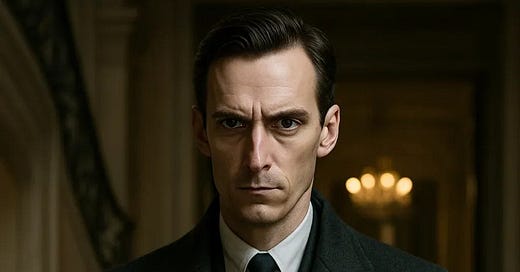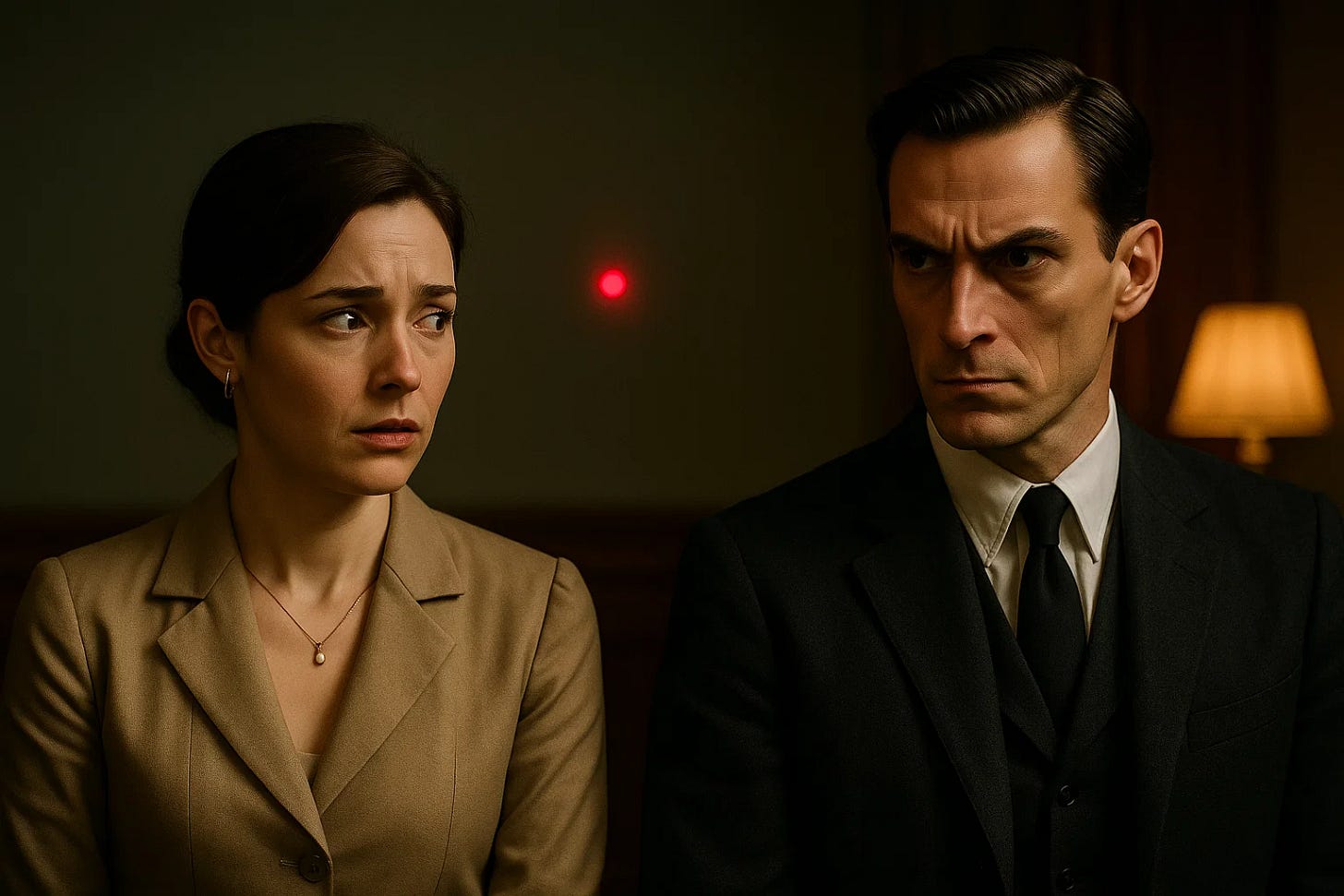What Price Does a Monument Pay for Its Legacy?
The Prophet’s Final Law | CH 3 - The Unforgiving Debate
This is Chapter 3 of a 12-chapter doctrine serial, The Prophet’s Final Law. "The cost of certainty is always solitude." Sydney has learned that truth demands a price—one that isolates, challenges, and redefines everything around him. He would pay it again.
The room was a crucible—every surface polished, every shadow deliberate. The Wolves Club had gathered for spectacle, not inquiry. Power perched in every seat. The air pulsed with the expectation of blood.
Sydney Manuver sat alone at the center, posture sharp as an accusation. Rain traced the high windows behind him, muting the city’s noise. All eyes landed on him but few met his gaze. Their faces were painted with the cowardice of anticipation, eager for enlightenment but desperate not to be its target.
Evelyn Roarke entered with a quietness that drew every gaze. Her presence radiated warmth, the kind that threatens to unmake winter. She took her place across the circle. The debate was set: freedom of speech versus hate speech—Sydney’s law against Evelyn’s healing.
Madame de Lys, eyes steady but voice unsteady, began: “Tonight, the circle will hear the cold and the warm. Mr. Manuver, Ms. Roarke—the floor is yours.”
Sydney rose. His movements were economical, every gesture honed to blade-precision. He did not speak for applause; he spoke for incision.
“Freedom of speech,” Sydney began, “is not a virtue. It is a myth—permission masquerading as principle. You worship it because it spares you consequence. But consequence is the only law that binds.”
His words slid through the room like ice water down the spine. The elite shifted, the novelist’s knuckles blanching on a notebook. The aristocrat spun his signet ring. The politician’s lips moved in silent calculation.
Sydney continued: “You defend discourse because you fear authority. But truth does not argue. Truth imposes. If my words wound you, it is not hate—it is proof you can still feel.”
Evelyn stood—her movements fluid, deliberate, a counterpoint to Sydney’s stillness.
She smiled, and her voice was a salve: “Speech creates worlds. Words can wound, yes, but they can also heal. We legislate not to silence, but to shield. To give the soul a chance to grow strong before the world tries to break it.”
Applause from the softer edges. Relief from those who had come to see mercy win.
Sydney waited, letting the applause die until the silence stung. He spoke softly, his deaf-man’s cadence flattening the room: “You legislate mercy and call it progress. But all you create is weakness. You shield the soul and rob it of armor.”
He turned to the crowd. “You call this hate. I call it the only test that matters. If your beliefs collapse under scrutiny, they were lullabies—not convictions.”
Evelyn’s eyes never left him. “And if your law creates nothing but scars, Sydney? Who will follow you except those too broken to care who they cut?”
Sydney met her warmth with frost. “If they do not feel you, they will never bleed for you. Truth is not comfort. Truth is sacrifice.”
The club’s founder shifted, the mask slipping. Sydney’s attention cut toward him—deliberate, surgical. “There are men in this room who have traded secrets for silence. Blackmail is not authority—it is cowardice wrapped in ritual.”
A rumble of unease swept through the circle. The founder’s hand twitched. The diplomat beside him looked away, sweat on his brow.
Evelyn pressed: “You love the myth more than the man, Sydney. You hide behind riddles and scars, but the only thing immortal about you is your loneliness. How many will you sacrifice to stay legendary?”
Sydney replied, “Wounds that fester are ignored truths. I would rather be scarred by reality than consoled by a lie. I do not ask for followers. I ask for survivors.”
A ripple of movement—restlessness, shame. The novelist could not meet his eyes. The philosopher disappeared into his scarf. The politician’s mask slipped; fear replaced calculation.
The debate pressed on, each argument colder, sharper. Evelyn defended connection: “Survivors? You call it survival, but all you’ve built is a mausoleum for your doctrine. You turn pain into gospel because you’re terrified of what you’d become if you let someone touch you.”
Sydney replied: “Empathy is a knife with the edge turned inward. You promise healing but deliver dependency. Pain is not the enemy—weakness is.”
A sharp intake of breath from the crowd. The club was splitting—some toward warmth, others to frost, all caught in the chasm.
Then, the rupture: The politician—face contorted, jaw trembling—stood so abruptly that his chair toppled backward, the crack echoing off the old walls. "This is madness!" he barked, voice raw with fear and frustration. The outburst hung in the air, ripping composure from the circle. For a moment, no one spoke.
Sydney’s eyes barely flickered; Evelyn simply waited. The silence pressed.
Then, as if that rupture had unsealed something deeper, the old philosopher at the edge of the circle began to sob. Hands shaking, glasses slipping, he choked out, "I cannot carry the weight of this anymore. This—truth, these laws—we are all broken. We are all complicit."
The room froze. Even Sydney and Evelyn stilled. The only real silence of the night—heavy, inescapable.
Whispers ignited along the circle—urgent, venomous.
The aristocrat jabbed a finger at the founder. “You—how many secrets have you sold in this room?”
The diplomat snapped back, “At least I never bought silence with blood!”
Two financiers exchanged accusations over past betrayals, each shouting names, tearing at the veneer of civility.
A woman in pearls hissed, “This is what happens when you invite prophets and butchers. This club is finished.”
In seconds, alliances evaporated. Years of decorum burned away, leaving only old rivalries and naked fear.
And in that silence, the reversal: a slight, almost invisible flicker of red in the corner—someone recording.
Sydney’s eyes narrowed, gaze locking onto the faint red light. He saw Evelyn see it too—her breath caught, a new calculation flickering behind her steady warmth. For a split second, neither addressed the room; both measured the weight of what it meant to be watched by the world beyond these walls.
For the first time, Sydney’s voice caught—thin, brittle.
A memory: the cold echo of his father’s hand. Legacy was isolation.
He blinked once, slow, and pressed on.
Evelyn’s facade wavered. She saw herself on that first night in the hate group’s circle—desperate, ashamed. Her next words trembled, then sharpened. For a moment, she let the world see the wound.
Sydney’s voice, when it rose again, was no longer for the club. It was for the ages, for every eye behind that camera. His rhetoric sharpened, each syllable branded for history: “You wanted a doctrine that could not be ignored? Here is the law: If they do not feel you, they will never bleed for you.”
Evelyn, too, adjusted—her words a scalpel for the future, not just the circle: “Prophets like you never survive their own sermons, Sydney. You write legends so you never have to live with what you’ve done.”
A silence heavier than violence settled.
In the shadows, the club’s founder rose, voice trembling: “This was never meant for the world.”
Sydney’s reply was final: “The world is not meant for comfort. Only law endures.”
The debate ended not with applause, but with an exodus—the elite slipping away, reputations shattered, the foundation of power cracked wide.
The law remained.
As the last eyes left the room, the recording light vanished.
The Wolves Club was now a tomb.
Is Sydney’s vision of truth worth the price of a broken world, or is it merely a legacy of ashes?
When the last whisper fades, will anyone be left to question the silence that followed?
Chapter 4 - The Leak drops next Thursday.










